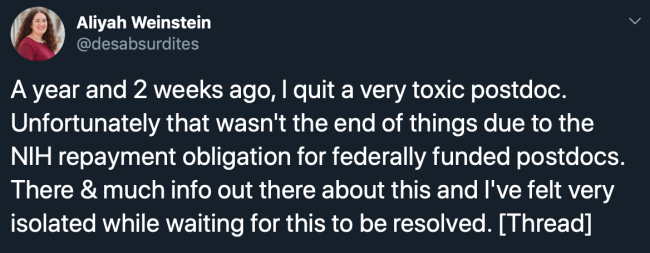You have /5 articles left.
Sign up for a free account or log in.

You leave a postdoctoral fellowship to escape a toxic lab environment. But you’re not safe yet: you need to wait a year to make sure that you don’t have to repay the salary you earned in that lab.
That’s what happened to Aliyah Weinstein, who quit a National Institutes of Health-funded postdoc at an unnamed public research institution 56 weeks ago. She only recently learned she would not have to pay back the $16,000 she earned there over four months to the federal government.
According to the NIH, those who terminate certain awards before one year’s time, for any reason, incur a payback obligation that can be satisfied financially or by health-related work. Postdocs agree to it by way of contractual fine print. But the experience of having to act on the obligation was isolating, Weinstein said. It was unclear for a long time whether her post-postdoc career in science marketing and communication would qualify as repayment.
In the end, it did. But Weinstein wants the repayment to be “common knowledge.”
Postdocs “should be able to make informed decisions about their futures, and that includes knowing how accepting a grant-funded position can impact their options,” she said. “The repayment obligation puts postdocs in a bind for so many reasons.”
In Weinstein’s case, she only learned of the repayment obligation once she was presented with the paperwork to secure her training grant, after she’d already been hired as a postdoc at a public research institution. (She didn’t want to name that institution or her current employer.) That didn’t leave time to consider the implications for her future or to discuss alternative funding options, she said.
After sharing her experience with others, including on social media, Weinstein said she guessed that many postdocs are unaware of the obligation, even if they’ve signed paperwork agreeing to it. Faculty members can help by informing their trainees, she said.
Whether they know it or not, postdoctoral recipients of NIH Research Service Awards who leave their funded positions or otherwise terminate their awards before one year, for any reason, have agreed to pay back the federal government. They may ask to do so in dollars or -- more likely -- by engaging in health-related biomedical or behavioral research, including teaching or administering research.
Postdoctoral trainees and fellows are required to begin their payback activities within two years of terminating their awards. And the government requires annual reports until the debt is paid.
Those with questions about what kind of work counts may contact the NIH’s Payback Service Center. But they can only get their payback activities certified -- and be truly in the clear -- after service is rendered. A letter with a link to the Ruth L. Kirschstein Annual Payback Activities Certification form is mailed to participants around the anniversary date of their award termination.
And so Weinstein waited for more than a year to see whether her post-postdoc work in scientific marketing and communication would count. Thoughts of possible, actual repayment were never far off.
Weinstein tried “finding a job that I enjoy and that would set me up for the career path I want,” she said. Yet in the intervening year, “the possibility of having to repay my salary financially was hanging over my head.”
Tracy Costello, chair of the Board of Directors for the National Postdoctoral Association and a career executive coach at STEMPeers, said she’s coached a number of postdocs who have brought the same issue to her attention.
“The short answer,” she said, “is that I strongly recommended they reach out to their program officer at NIH to discuss the situation.” Costello would never recommend a “wait and hope for the best” method.
NIH officers are aware that “not every mentoring relationship works out and that bright candidates will choose a career option that fits their career goals, and not necessarily in an academic faculty track,” she said. The institutes have amended their career success policy language to reflect those facts, across their funding source, Costello added -- including the repayment obligation attached to training grants.









